#ecoanxiety
Text
"People assume that in the 50 years since the first Earth Day we've made no progress. That we're in a worse position now than we were in the 1970s, that there's no point in environmental action," [...]
Quite the opposite is true. Climate-friendly advances that would have seemed impossible even 10 years ago are now commonplace. And three times in the past 50 years humanity has faced--and fixed--massive, man-made global environmental issues.
The fight isn't won yet, but don't forget that we have made enormous progress.
We would be in a much, much worse position if it wasn't for all the incredible work of environmental activists who came before us, most of whose names and contributions we will never know. They are the reason that we have a fighting chance now, and we owe it to them to pick up their banner and keep running.
#earth day#climate change#environment#global warming#hope#climate anxiety#climate grief#ecoanxiety#ecogrief
1K notes
·
View notes
Text

We need more hope-keepers in the climate justice movement. More people who hold evidence-based hope in their hands that celebrate the continued momentum and progress that is being done. Because without them, who would we lean on in times of despair?
-qbv
#queerbrownvegan#sustainability#climate change#climate justice#activism#social justice#mental health#environmentalism#intersectionality#climate anxiety#ecoanxiety#doomism#hope
712 notes
·
View notes
Note
How can I stay positive regarding the wildfires?
It can be really hard in the face of so much destruction. I don't know how much anyone can specifically stay positive in the face of disasters like this -
but I can give you some thoughts about how to let hope live alongside everything else you're feeling about this, and how to avoid spiraling and remember that this is not proof that we're doomed.
Possibly relevant note lol is that I've lived my whole life in California, so suffice to say figuring out how to move forward among the consequences and destruction of massive wildfires is something I'm definitely not new to.
I remember walking to my classroom in elementary school, about 20 years ago now, and it was literally snowing ash around me. This too shall pass.
Take a few deep breaths. I know it's cliche but it's also important
Zoom out in terms of perspective: Wildfires can make the sky look apocalyptic (like I said, I have lots of experience with this!), but they are regional, and they always end. These wildfires are awful but this specific wave of fires is happening in just one country in a huge, huge world. There's far more land that isn't burning
Canada is about to get substantial international aid in fighting the wildfires - there are already 200 additional firefighters headed over from the US and France, and Canada (Quebec specifically) is also already in talks with Costa Rica, Portugal, and Chile about additional firefighters/resources. Help is on the way and these numbers really will make a big difference, and as the disaster continues (unfortunately it is uh...pretty early in fire season), more help will be sent. People are doing what they can to help, because in the face of disaster, that's what we're wired to do
There are actually MUCH better fire management plans than just about anyone is using, esp in North America but that we COULD implement and increasingly WILL going forward. A lot of the wildfire situation these days is because of the West's incredibly wrongheaded derision toward traditional Indigenous land and ecosystem management practices, including cultural prescribed burns that keep massive wildfires from happening. California in particular is already partnering with several First Nations to revive prescribed burns, to significant success. As fires continue to be terrible, more and more places will get on board with this. We can and will implement practices that will truly change our situation
Cultural burns work because, ironically, the reason for the wildfires is that "is that we've been so good at putting out every fire possible that it has led to overly dense forests and a buildup of burnable material like branches and dry vegetation" that makes wildfires much worse in a number of ways. At lower intensity, however, as with cultural burns, forest fires can actually have huge environmental benefits
Finally, every time a natural disaster happens like this, as awful and destructive as they are, it serves as a wake-up call for thousands of people and adds both ever-mounting urgency and ever-mounting evidence to the importance of fighting climate change, which really does translate into action. For a lot of people, "saving the environment" feels super distant - but you know what feels super immediate? Saving their homes from burning down (or getting flooded or otherwise destroyed, etc. etc.) In 2021, the UN ran the world's largest climate survey, across 1.2 million people and 50 nations, and almost TWO-THIRDS SAID THAT CLIMATE CHANGE IS A GLOBAL EMERGENCY THAT WE NEED TO WORK HARDER TO ADDRESS. Imagine that 10 years ago! That other third of people aside, this really is real and massive progress
Also, every time there's a big disaster like this, climate change deniers look more and more baldly ridiculous. Think about it: How often did you hear US Republicans bullshitting about climate change denial 10 years ago? And how often do you hear them doing it now? In fact, there's increasing evidence that Republicans really are shifting on climate change (mind you they're managing to do it in an obnoxiously somehow pro-fossil-fuel way, but it's still a major sea change). Some of them are literally calling for a clean energy transition, and Kevin McCarthy himself (guy in charge of the US House right now) created a task force for to a conservative climate change agenda that acknowledges climate change is real. There's now a conservative climate conference that does active lobbying and a House Conservative Climate Caucus, which somehow has SIXTY MEMBERS. Again, something that would've been unimaginable just six or seven years ago.
Every acre that the fires burn this year is an acre that's pretty guaranteed to not burn next year, for what that's worth. (And I do think it's worth mentioning, esp with such a high number of acres)
The battles are going to be hard, but I truly believe that even the ones we lose often bring us closer to winning the war.
Fires burn, but life always grows back.
#climate change#conservatives#united states#canada#us politics#climate change denial#ecoanxiety#ecogrief#environmental despair#climate anxiety#forest fires#forest fire#quebec#indigenous#first nations#forestry#ecosystems#fire management#firefighter#republicans#united nations#kevin mccarthy#hope
557 notes
·
View notes
Text
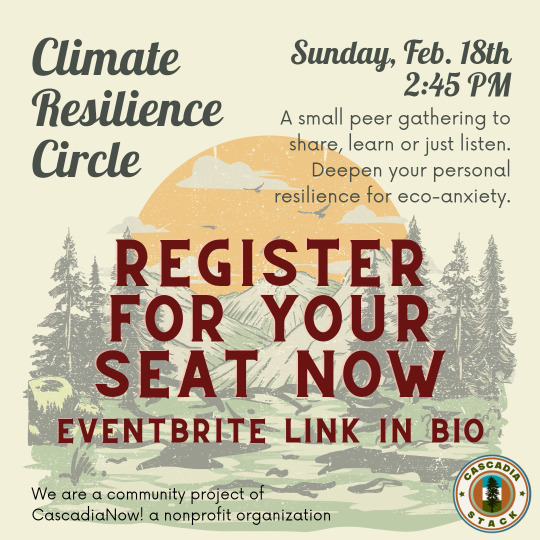
Our THIRD Climate Resilience Circle. Portland, Oregon. Are you experiencing anxiety, grief, or stress going through life in this current war-torn, climate crisis, social mess that is 2024?
The Circle is a safe space to be in community with peers struggling like you. We listen some folx share, and we learn together how to deepen our personal resilience to continue to show up for your responsibilities.
It's hard to keep going when we see the shit storm that is going on in the world. We know. We feel that way too.
Learn about Cascadia Stack here
Get registered for the next Circle, Feb 18th
#climate adaptation#ecoanxiety#solarpunk#environmentalism#social justice#climate grief#intentional communities
2 notes
·
View notes
Photo

Sometimes I feel like I'm not doing enough, especially when it comes to eco-anxiety and the planet. But I realised today that it's because I've normalised the things I already do. Our council don't collect glass, so I travel with it to work for recycling. I sort plastics. I compost. If something means a lot to you, you already are likely doing more than most in that area. You are already doing enough. It's just become routine. Be mindful, take a step back and congratulate yourself for all the things you currently do. #routine #enough #doingenough #ecoanxiety #green #recycling #reuse #fix #planet #mentalhealth #lifestyle #support #action https://www.instagram.com/p/CpuRj03tC6k/?igshid=NGJjMDIxMWI=
#routine#enough#doingenough#ecoanxiety#green#recycling#reuse#fix#planet#mentalhealth#lifestyle#support#action
7 notes
·
View notes
Text
First Reformed and interpassivity

This last term, I spent a lot of time writing about Paul Schrader's haunting 2017 film First Reformed. In the wake of his new film Master Gardener's impending wide release, I have rewatched it again, in addition to his more recent film, The Card Counter. First Reformed has developed quite the following online in the six years since its initial release, and even some fairly trafficked memes, which really speaks to the breadth of what is so captivating about the film.
This post is thinking through ideas about agency and personal responsibility with regard to climate anxiety, namely an anxiety that attempts to satisfy guilt, through interpassivity, which satiates the individual, but does nothing to benefit any substantive material action to combat climate crisis.
One of the key theoretical throughlines between contemporary neoliberalism and conservative ideology is the prominence of possessive individuality. The environmental journalist Martin Lukacs lays out two principal objectives of neoliberalism as scaffolded by the likes of Reaganomics and Thatcherism: (1) to dismantle barriers to the exercise of unaccountable private power and (2) to erect those private powers to the exercise of any democratic public will. We see this through the nonchalance of a constant reshuffling of privatization laws throughout the last four decades, particularly with regard to the oil sector, but certainly applicable to other forms of energy commerce.
What’s more prescient though to this essay, is how neoliberalism has come to shape the modes and affects of its subjects and their everyday lives:
[Neoliberalism’s] trademark policies of privatization, deregulation, tax cuts and free trade deals, with atmosphere like a sewage dump, has hamstrung our ability, through the instrument of the state, to plan for our collective welfare. […] Studies show that people who have grown up under this era have indeed become more individualistic and consumerist. Steeped in a culture telling us to think of ourselves as consumers instead of citizens, as self-reliant instead of interdependent, is it any wonder we deal with a systemic issue by turning in droves to ineffectual, individual efforts? We are all Thatcher’s children. […] Neoliberalism has taken this internalized self-blame and turbocharged it. It tells you that you should not merely feel guilt and shame if you can’t secure a good job, are deep in debt, and are too stressed or overworked for time with friends. You are now also responsible for bearing the burden of potential ecological collapse.
Lukacs deems it eco-consumerism, but the term we have adopted more recently is green capitalism, a recapitulation of the tragedy of the commons, whereupon we (collectively and individually) overuse resources, but specifically resources that hurt the ecosystem. The important takeaway though, is that while these are unethical individual actions, they pale in comparison to the true threat to the planet, which is imperial militarism. Individual impacts are practically irrelevant; every person and factory on the continent could cease all emissions and the climate war would rage on, because the US military is the primary belligerent. The American military produces high enough greenhouse gases to render the entire globe in continual climate crisis. Individual environmental impact becomes more of a hyperbolic categorical imperative than an ontological urgency.
Schrader’s film First Reformed, contemplates environmental responsibility through its narrative about the life of an Upstate New York Protestant minister named Ernst Toller (Ethan Hawke), who struggles with staying devout amidst a cancer diagnoses, shrinking service attendance at his church, and a crisis of faith. At first, Toller looks inward, seemingly finding solace in the writing of the Trappist monk Thomas Merton, but eventually seems to come to terms with his moral responsibility to engage with the outside world. One of his congregation members, a pregnant woman named Mary Mensana (Amanda Seyfried) approaches him about her husband, Michael Mensana (Phillip Ettinger) an anti-natalist growing more and more detached from his life. Michael is enamored with radical climate activism and would probably be deemed by most film viewers as an ecofascist. Mary finds a suicide vest in Michael’s workshop and at first, Toller condemns Michael. However, following Michael’s suicide later in the film, Toller becomes more and more empathetic to Michael’s philosophies as he pours over the research on Michael’s laptop and becomes familiar with the realities of the climate crisis.

First Reformed (2017 dir. Paul Schrader)
At a glance, it is not a film about climate war directly: its primary focus appears to be the specific story of a man who is pushed beyond his ethical limits and spurred into action. This is methodic narratively for Schrader, who often pens screenplays with protagonists driven to no longer function in their circumstances. His screenplays—Taxi Driver, Rolling Thunder, Bringing out the Dead, and recently, The Card Counter)—would never be accused of formulaic writing, but tend to depict protagonists in this same way. Toller fulfills the Travis Bickle archetype, although arguably considerably less unhinged at the start, by the end of the film he regularly consumes a cocktail of Pepto-Bismol and Whiskey, a telltale sign of mental instability. The film climaxes with a standoff between Toller and Edward Balq (Michael Gaston), a millionaire CEO who financially benefits the church, but also owns a large polluting factory nearby and invests in oil companies. While the church celebrates its 250th anniversary, with a full attendance for service, Toller plans to wear Michael’s suicide vest and kill everyone including Balq, who is attendance. At the last minute, Toller changes his mind. He sees Mary entering the church, which compels him to forgo the suicide bombing. Instead, he wraps himself in barbed wire and prepares to drink a glass of drain cleaner. First Reformed through its narrative is wholly consumed with the environment and the extrinsic anxiety of interpassivity, of contribution that does nothing to resolve actual conflict. How can we understand ecological interpassivity and its anxieties?
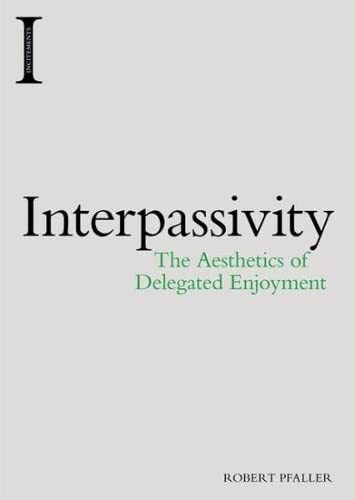
Interpassivity by Robert Pfaller. Edinburgh University Press, 2017.
What is interpassivity? German critical theorist Robert Pfaller coined an aesthetic theory of delegated enjoyment which he called interpassivity. Using an Althusserian framework, Pfaller catalyzes the peculiar phenomena of detached passivity misconstrued as interactivity. Since the concept’s origin in 1994, interpassivity has accelerated into a vibrant scholarship taken up most notably by Slovenian philosopher and internet meme Slavoj Žižek, who credits Jacques Lacan’s Seminar VII as interpassivity’s conceptual heritage. In that seminar, Lacan muses on the virtue of The Chorus in Greek tragedy. Pfaller sets substitutional proclivities as the central nature of interpassivity. Nonautonomous inaction will satisfy; it is all that the individual needs. On the topic, Žižek wryly asserts that the interpassive individual’s psychological interior can think about whatever they want, no matter how obscene or incriminating: “To use an old Stalinist expression: whatever I am thinking, objectively I am praying." (p. 32).
The discourse of interpassivity first begins in the early 1990s, when much of culture studies and psychoanalytic theory was consumed with ideas surrounding interactivity, both in art and in technology. In more recent years interpassivity has seen much scholarship surrounding the phenomena of streaming content, whereupon the viewer is no longer purveying agency through ludonarrative in playing a game themselves, but passively, watches someone else do it, and thus, achieves the same pleasure principle. Pfaller’s second full-length book on interpassivity is titled On the Pleasure Principle in Culture: Illusions Without Owners. The framing of interpassive interactivity as the process of self-assurance through illusion is precise. It captures the illusory nature of the act of interpassivity, especially regarding environmental activism. We believe that we are conducting ourselves altruistically but in reality, we are not. One cannot help but recall Žižek’s famous proclamation that not only do we not really know how things are, but we also don’t even know how things appear to be.
Let us anticipate that the neoliberal environmental nonprofit industrial complex for interpassivity, is much the same as Louis Althusser casts the sports industry for ideological apparatus. They are both reliant on socialized principles of self-abandon; the central desire is to forget. Environmental neoliberalism is ideological because it reproduces the conditions of production of labor forces and the social relationships of that production. Under its present media surveillance, the nonprofit sector ensures that people will work in the same way next year as they do this year, and that they will integrate expectantly into society. What is astounding about this reproduction through ideological practices is that everyone starts participating by themselves without having to have their own secret government entity forcibly harassing them the whole way. The readiness to act spontaneously cannot be achieved through violent means; violence and repression serve at best, to make people passive. According to Althusser, the fact that people are active without being coerced is an outcome of ruling ideology (pp. 232-273). Contemporary neoliberal life is often an exercise in puritanism: the guilt that surrounds the personal responsibility of eco-consumerism is the centralizing affect for the drive to recycle, to consume ethically, and be on the right side of every controversy. In this way, interpassivity is the ultimate failsafe. For the neoliberal bicameral mind, donations to the environmental nonprofit excuse away subsequent anti-environmental acts that could be incurred and gives a sense of fulfilling one’s societal expectation, thus relieving two anxieties at once. Consider the patron who, when ordering a drink at Starbucks, puts two dollars into the collection tin for an environmental nonprofit. The patron experiences slight discomfort or anxiety and attempts to assuage the affect by what they believe is action, against passivity, through altruism. In reality, this is interpassivity at work. The subject allows the nonprofit complex to act as proxy and they feel temporary elation, like smoking a cigarette to ease the anxiety of nicotine cravings, which ironically strengthens the addiction.
Pfaller offers a defense of interpassivity in the 2017 introduction to his book on the subject:
“…If we take seriously Althusser’s idea that becoming a subject is one of the key mechanisms of ideological subjugation (see Althusser, 1971), then becoming an active subject cannot be turned into any universal political solution. […] The ‘theoretical anti-humanism’ of the concept of interpassivity has from the very beginning united all who have been interested in this perspective. As a result of this, though not exclusively so, the theory of interpassivity was enthusiastically received. And so, just as Althusser was a theoretical anti-humanist, we were theoretical interpassivists. However, the question of whether one should also feel sympathy with the practices of interpassivity or not was a wholly different and open matter at that time. (p 4-5).
Here we see the return of a familiar structural Marxist claim, rejecting notions of human essence and transcendentalism and further cementing the notion of hegemonic systems of socio-economic ideology. Within the theoretical lineage of Lacan->Althusser->Žižek, Pfaller can readily problematize the idea that inaction is amoral, if action itself is not inscrutable (a rudimentary concept in the realm of antihumanism).
Whether or not interpassivity as it was originally envisioned in relation to interactivity by Pfaller in 1996, can be qualified as a moral or sympathetic act, remains to be seen. One could potentially have more sympathy for this concept of interpassivity in other avenues than how this essay recalibrates the term toward the neoliberal act of interpassive activism. Interpassive action is so applicable to our contemporary lives, even in progressive circles. An oft-hastily muttered epigram we hear frequently: there is no such thing as ethical consumption under capitalism, as the justification for all kinds of questionable purchases. This phrase has no clear etymology, although internet historians have traced it back to several meme accounts on Twitter and Tumblr. We can imagine it however that it is a likely descendent from readings of Adorno and Horkheimer, among others. This ends/means justification is precisely the kind of nihilism that the interpassive act thinks it is counteracting, when in reality, it is an extension of that nihilism:
In interpassive behaviour, people take up selective contact with a thing in order, in exchange, to entirely escape that very thing – and indeed, not only as we have established to begin with, with regard to an identification with an illusion. Interpassivity is thus a strategy of escaping identification and consequently subjectivation. Precisely there, where it is suggested that they become self-conscious subjects (through interpellation in the sense of Althusser [1971]), people seize interpassive means to flee into self-forgetfulness. (p 7-8).

Sokoban, Hiroyuki Imabayashi, 1982.
At first, this definition flummoxes, because we think of the altruistic act of activism, particularly in the spectra of nonprofits and social media as a supremely self-conscious endeavor, one that is all about being witnessed by others: ‘look how benevolent I am!’ In reality it is as Pfaller describes: an act of anxious desire to escape the thing, to no longer conceive of, or participate in, the anxieties of climate change. Althusser reflects on the “teeth-gritting harmony” of the ideological state apparatus (p. 248), how it manifests, an existence that should repulse any Marxist, one that causes its subject to live anxiously. The act of interpassivity then, is an illusory break from that anxiety, one that suggests ideological freedom, but only the suggestion.
Pfaller (and Žižek) muse on interpassivity as an anti-ideological phenomenon, or at least, an act that pertains to some new form of ideology that does not rely on becoming subject (in the Althusserian consideration), which would suggest a potential morality of the interpassive person, a person sidestepping the conditions of ruling hegemonies. This is an idealistic reading of interpassivity, one that does not consider all of its problems, the most immediate of which seems to be its compulsory sense of completion. It is not the compulsion itself that is concerning but that this compulsion somehow actively underestimates the ruling ideology, a grave error. It should be the purpose of postmillennial theory to de-hegemonize our unconscious to try and see how socio-cultural phenomena like interpassivity might operate in service to the state, rather than for the holistic ethics of the individual citizen-environmentalist.
First Reformed is a film that presses this point, on the pathos of the individual and their ethical responsibilities for living in the world. Interpassivity surrounds the idea of participation as the locus for environmental action: will you step up, will you act? The film is all about absolutions, about imperatives. It’s also a deeply personal film for its director Schrader, who was raised by strict Dutch Calvinists in Grand Rapids and had intended to become a minister after studying theology at university. But a chance encounter with film critic Pauline Kael steered him toward film criticism instead. He published a book on ‘slow cinema,’ which highlighted three directors, most notably his primary inspiration, Robert Bresson. Schrader began penning screenplays in the early 1970s, his first major being Sydney Pollack’s The Yakuza, followed by his seminal work with Martin Scorsese, Taxi Driver. Over the course of his career, he has penned nearly 30 screenplays and has directed 24 films, most of which, saw him as the screenwriter.
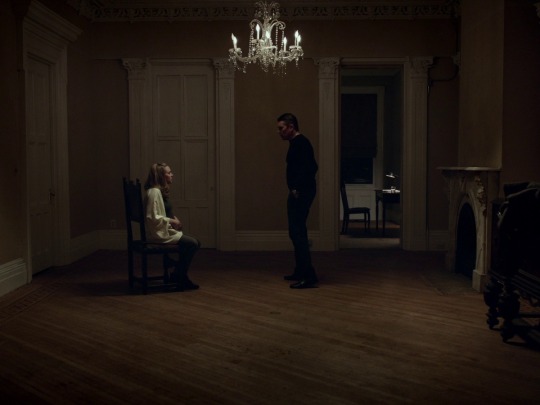
First Reformed (dir. Paul Schrader, 2017).
However, beneath the surface of the film’s appearance of a more standard arthouse drama character story, the film is bursting with environmental commentary. After Michael’s suicide, Mary gives Toller his laptop, where he finds endless streams of articles, videos, and digital ephemera surrounding the climate crisis. The film contemplates the delusion of optimism in the wake of climate war, while also folding its arms at the nihilism of giving up too. It’s a comforting spiritual characterization of our ethical circumstances. In an interview with Cinéaste, Schrader muses on the ecological anxiety at the heart of the film’s spiritual narrative: eschatology:
Christianity and Judaism have been talking about it from the very beginning. What is our purpose on earth? What is the goal? We have now entered a moment in time where we can actually see, if we stand on our tippy-toes, the end of our duration as a species. What was for thousands of years a hypothetical discussion—what happens when mankind no longer exists?—has now become an actual discussion. It gives shading to the search for meaning or purpose. […] We have a threat that we can’t do anything about, or at least that we have decided we don’t want to do anything about. It’s probably too late to reverse that. In fact, I do think that it is too late—too late to save human life on this planet. (pp. 28-33).
End times takes on a very different connotation when you are living in it, even if it is a centuries-long procession. The severity of these ramifications does not necessarily change much in terms of narratology, but it does alter how we come to a film’s narrative and relay it back to our own climate crisis.
Schrader credits Deleuze’s film theory and Andrei Tarkovsky’s cinematography as the most crucial influences in his own precise use of duration in First Reformed. In his film theory book Cinema 2, Deleuze catalyzes Henri Bergson’s condensation of time as a bridge to reconstitute together movement-image and time-image in film. He is interested in how characters in film move through space and time, in the splitting of time that occurs when film moves from past-to-present, through what is projected on to the screen, “the uniting of an actual image and virtual image to the point where they can no longer be distinguished.” (p. 335). Deleuze names this unification crystal-image. Schrader puts crystal-image this to use affectively, in a way where the viewer is forced to sit with anxiety in an extended shot, or pan, feeling the weight of dread grow, as time becomes uncertain and notions of the speculative begin to take root.
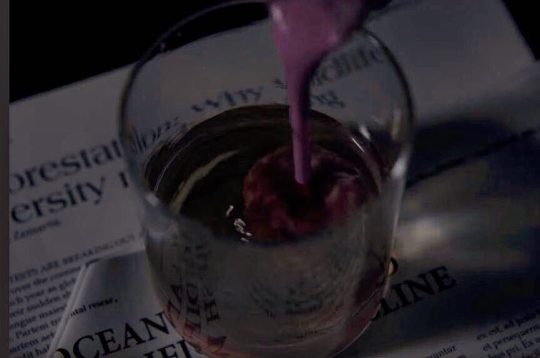
First Reformed (dir. Paul Schrader, 2017).
First Reformed’s most experimental sequence embodies this idea, and it occurs while Toller and Mary are doing an intimate breathing exercise together. The cinematography shifts and starts panning over various scenes of industrialization and environmental devastation from a Gods-eye view, in the mode of Godfrey Reggio’s Koyaanisqatsi. First we see the ocean, filled with oil; a seemingly unending mountain of rubber tires; rows and rows of industrial smokestacks and lit up factories; a logging bulldozer in the process of deforestation; shots of what first appears to be a village’s rock-wash, but then reveals that it is not a rock-wash, but an enormous amount of garbage; a large and spreading brushfire, and finally, a shot of an oil tanker, partially submerged in a stagnant ocean, black with oil. In general, Schrader is very reserved in focused frame shots, with very sparse movements; only one dolly was used in the filming of First Reformed. What results is a film that often at first feels like a stage production, until these moments of experimental environmental critique, where suddenly the cinematography feel more like the collage films of Adam Curtis than Taxi Driver.
In First Reformed we see Toller, Mary, and others struggle to come to terms with the challenge left by Michael, of what it really means to care about the world and the people living in it. This feels more evident when Toller first meets Balq, the antagonist. At Michael’s wake, Abundant Life, the evangelical megachurch that owns First Reformed, has their children’s choir perform an acapella rendition of “Who’s Gonna Stand Up” a protest song by Neil Young, from his 2014 album Storytone. Balq is annoyed because a local news website reported on Michael’s wake, calling it a political protest, and mentioning both First Reformed and Abundant Life by name. The service was held at a toxic waste site, one that he insists was cleaned up by EPA superfunds (it clearly was not cleaned up). This infuriates Toller who recognizes how materially meaningless the choice of song really is, when set against the profound damage being done by Balq’s companies. He asks Balq if God will forgive us. In a way, Toller is recognizing the danger of interpassivity for the neoliberal imagination. While the Abundant Life pastor Joel Jeffers (Cedric Kyles) tries to hastily apologize to Balq, Toller becomes apathetic, seemingly aware how even the thing Balq is qualifying as an attack against him, is largely ineffectual.
Life during climate war is suffocated with the fumes of anxiety, it is omnipresent. We see Michael in FirstReformed devastated by the realities of the damage done; he cannot bring himself to watch his child be brought into the world he no longer wishes to be a part of. Michael’s devastation leads him to construct a suicide vest. Mary finds the vest, and Toller takes it. It is unclear to the audience if Michael’s decision to end his own life is because he realized Mary had discovered it, or if he truly could not bear it anymore. Regardless, the anxieties both Michael and Toller emanate feel enormously reflective of the kinds of liberal anxieties that interact with environmental inactions, that render zero impact. The difference is in their determination. These are two people preparing to give their lives for the hope of meaningful material benefit. That’s a radical act of altruism, not interpassivity. In the end, Michael dies, and Toller decides against the suicide bombing, but the contemplation feels endlessly relevant to a moment where collectively, we are beginning to reevaluate what it means to live in climate war.
Althusser, Louis. On the Reproduction of Capitalism: Ideology and Ideological State Apparatuses. Trans. G.M. Goshgarin. (New York: Verso Books, 2014). 232-273.
Deleuze, Gilles. Cinema 2: The Time-Image. Trans. Hugh Tomlinson and Robert Galeta. (Minneapolis, MN: University of Minnesota, 1986). pp. 335.
Haynes, Todd. Safe Sony Pictures, 1995. 1h 59m.
—. “Todd Haynes and Julianne Moore on Safe.” Sneak Peaks. The Criterion Collection. Dec. 15, 2014. 36m.
Lukacs, Martin. “Neoliberalism has conned us into fighting climate change as individuals” (London, UK: The Guardian, July 17, 2017).
Nam, Sean. “Hungering and Thirsting for Righteousness: An Interview with Paul Schrader.” Cinéaste Vol. 43, No. 3 (Summer 2018), pp. 18-23.
Pfaller, Robert. Interpassivity. (Edinburgh University Press, 2017).
—. Pleasure Principle: Emotions Without Owners. Trans. Lisa Rosenblatt. (New York, Verso Books, 2014).
Sanders, Barry. The Green Zone: The Environmental Cost of Militarism. (Chico, CA: AK Press, 2009).
Schrader, Paul. First Reformed. A24 Films, 2017. 1hr 53m.
Žižek, Slavoj. The Sublime Object of Ideology. (New York: Verso Books, 1989). p. 32.
—. Welcome to the Desert of the Real: Five Essays on September 11 and Related Dates. (New York: Verso Books, 2002).
#first reformed#paul schrader#film#essay#ecoanxiety#interpassivity#zizek#pfaller#film critique#a24 films#ethan hawke#climate action#climate war#climate crisis#calvinism#christianity#althusser
10 notes
·
View notes
Text
When this global heatwave is turning everyone into vampires while trying real hard not to be paralyzed by eco-anxiety
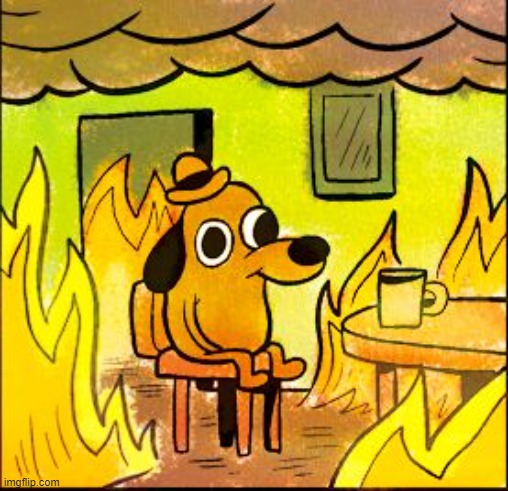
#heatwave#memes#ecoanxiety#climate change#its actually feeling like winter where i am#where it was supposed to be hot af and making us all vampires#but instead we wear coats made against the wind to brace chilling temperature lol
2 notes
·
View notes
Text
even posting my complaints is killing me with anxiety because servers consuming energy and whatever else just for me to air my bullshit thoughts (: ahahahaa
2 notes
·
View notes
Text
How Can We Prevent Climate Grief?
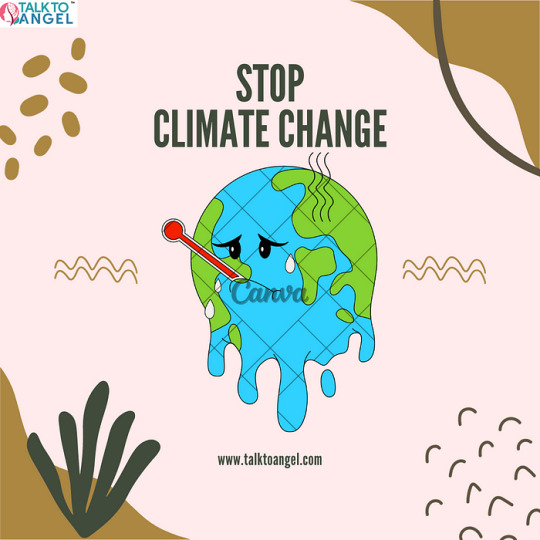
Preventing or mitigating climate grief, also known as eco-anxiety or climate-related psychological distress, is a growing concern as the impacts of climate change become more apparent. Mental health support, such as counseling through platforms like TalkToAngel, can play a significant role in addressing these feelings. Here are some strategies to prevent climate grief and how counseling services can assist:
1. Climate Education and Awareness:
Knowledge is power. Understanding climate change, its causes, and its potential solutions can help individuals feel more empowered and less helpless. Mental health professionals can provide guidance on where to find reliable information and resources.
2. Take Positive Action:
Actively engaging in climate-friendly activities can provide a sense of purpose and control. Counselors can help individuals identify ways to reduce their carbon footprint and get involved in environmental initiatives.
3. Emotional Expression:
Talking about climate-related concerns and feelings is essential. Counselors can create a safe and non-judgmental space for individuals to express their emotions, whether it’s fear, grief, anger, or frustration.
4. Mindfulness and Coping Techniques:
“Online Counselor” can teach mindfulness and relaxation techniques to manage stress and anxiety related to climate change. These practices can help individuals stay grounded and reduce overwhelming emotions.
5. Eco-Therapy:
Some therapists specialize in eco-therapy, which involves outdoor activities and nature-based interventions to promote mental well-being. Being in nature can help alleviate eco-anxiety.
To read more:-https://www.talktoangel.com/
#ecoanxiety#climatechange#ping#sustainableliving#climateanxiety#sustainability#noplanetb#climatestrike#planetorplastic#climatecrisis#uprootthesystem#ng#klimatstrejk#fightforclimatejustice#planetaryhealth#fortheloveofourchildren#anotherworldispossible
0 notes
Text
🌍📚 "Don't Even Think About It" by George Marshall: Breaking Down Emotional Barriers to Climate Action 🌪️
Read Here
#ClimateChange#EmotionalResilience#ClimateAction#EcoAnxiety#GeorgeMarshall#DontEvenThinkAboutIt#ClimateResilience#Climate#earth#ClimateEmpowerment#BookRecommendation#LearnFromBooks#ClimateAdvocacy#ClimateMentalHealth
0 notes
Link
It took 90 days for the fungi to degrade 27 per cent of the plastic tested, and about 140 days to completely break it down, after the samples were exposed to ultraviolet rays or heat.
Chemical engineering professor Ali Abbas, who supervised the research team, said the findings were significant.
"It's the highest degradation rate reported in the literature that we know in the world," the professor said.
From ABC News Australia
#plastic#plastic pollution#plastic recycling#trash#environment#hope#good news#technology#science#ecoanxiety#environmental grief#environmental anxiety#ecogrief
3K notes
·
View notes
Text

For many of us the natural response to respond in witnessing or seeing a disaster is calling it a natural disaster. Why? Because we’ve been taught to process climate disasters as natural or more so like a phenomenon that happens occasionally.
But over the last few decades, these climate disasters have been unfolding at rapid rates in which species do not have time to process, survive, and strategize. Trauma has a way of hindering our minds and also how we show up in our activities.
Trauma freezes us in a place where our brain decides to protect us from the pain, as a mechanism of how much our soul is trying to protect us, but it also hinders our ability to heal at times. We are seeing high rates of environmental land trauma, whether from displacement from colonial forces, the death of living systems, or the disappearance of culture. What was once a sacred space for joy is now a desecrated area that has been damaged. We absorb that as beings, we feel it, see it, smell it, and change the way we move from that point on.
When I heard the term Tierratrauma from Glenn Albrecht, it stuck with me because we often feel that we overreact when witnessing climate disasters. But the truth is, this expression is valid and our experiences have lasting effects on the brain. How can we protect ourselves when crises continue to plunder our minds and bodies. How do we begin to shift conversations around anxiety to trauma and rage of those who have faced the most harm? Those are questions I'd like to answer.
qbv
#queerbrownvegan#blog#environment#environmentalism#psychology#mental health#activism#social justice#climate justice#climate change#climate crisis#trauma#ecoanxiety#bipoc#queer#intersectionality#intersectional environmentalism
170 notes
·
View notes
Text
I’m in a really weird place right now. I finally have a stable situation (job, housing) and I just. cry all the time. at work. at home. I’m always sad. I’m always thinking about how if my life was to end it wouldn’t be so bad.
I all I think about is how my life would be better if I owned a car and could leave the city, live in a quiet place close to nature. But at the same time I don’t want to be one of those people who are dependent on a car. I don’t want to participate in slowly destroying our lives on earth. I don’t want to participate in exploiting earth.
And yet I already do, and I don’t really have a choice.
Imagining that climate change could be so drastic and quick to happen that it would kill all human life on earth is the only way I can breath. I like to imagine a time when humans are no longer and life on earth can finally heal and that makes me happy.
I am fully convinced that us humans cannot change, or rather, humans with power don’t *want* things to change. I don’t want to continue to kill life with them, for them.
0 notes
Text

Why "Prep" for Climate?
Or, alternative title: Have you heard of chess?
Nah, not to be a smart ass, but if you "play the tape" and think ahead a few possible steps, took, then pawn, then knight, then queen, you could for see a need to stock food for the climate crisis.
It's already happening
If you notice, so many farmers and even factory farms are pulling in smaller harvests due to drought a d other climate related challenges. The thing about how the weather patterns are changing is that the frequency of the changes is increasing and the level of intensity is also increasing. So, what does this mean? We should stick some of our favorite foods.
Corn
I love corn, for like three meals a week. Green beans and broccoli are my top three go-to's every single week. Oh but wait, check the news, corn farmers are currently struggling.
My start-up company brings people into this chat through the arts & humanities.
Live painters
Spoken word poetry
Singer/songwriters
Stand-up comics
Our creatives have an opportunity to express the understanding of how this is all going to play out...how if we see the pieces of the puzzle, we can take certain actions to-- basically... Take out an insurance policy for our chosen family units.
Please comment.
#climate preparedness#socialentrepreneurship#ecoanxiety#preppers#songwriter#stand up comedy#poets on tumblr#poetry#climatepreneur#live painters
1 note
·
View note
Photo
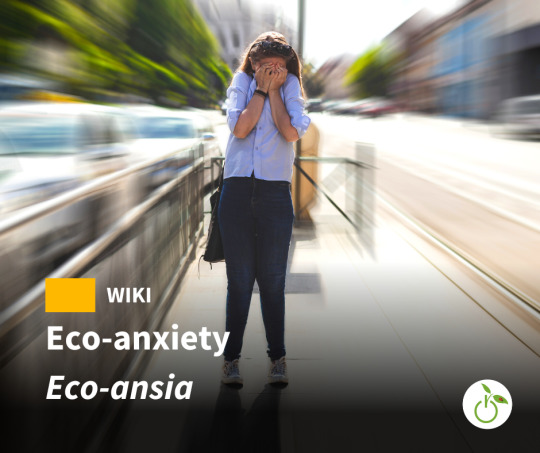
ECO-ANXIETY
What is eco-anxiety and why young people suffer more from it
@gw-360
0 notes
Text
Hazte un año sabático en 2023
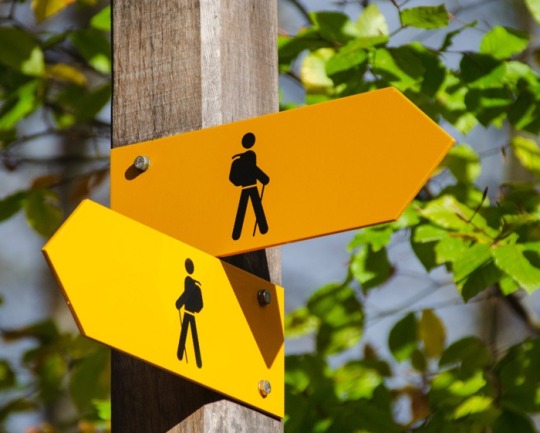
¿Cuál es la herencia que vas a dejar a tus descendientes? Y no, no estamos hablando de dinero 😥
¿Alguna vez has pensado en las toneladas de basura y de CO2 que producimos y que tendrán una vida tóxica de miles de años? Nuestra herencia ya no es solo económica.
Pero no venimos aquí a generarte ecoansiedad, sino a ofrecerte soluciones, tómate un año sabático para reflexionar... ➡️ Sigue leyendo
#Señales de sostenibilidad#Vida de baja huella#Vida sostenible#Ecoansiedad#Sostenibilidad#Signs of sustainability#Low life footprint#Sustainable life#Ecoanxiety#Sustainability
0 notes